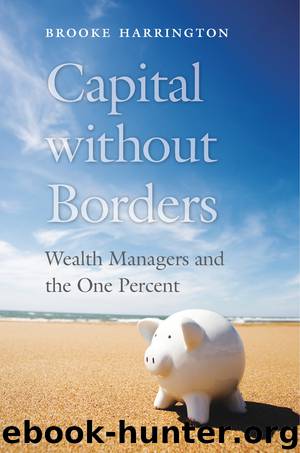Capital without Borders by Brooke Harrington

Author:Brooke Harrington
Language: eng
Format: epub
Publisher: Harvard University Press
The role of wealth management
As part of this neglect, questions of agency have remained almost totally unexamined. For example, Piketty’s observation about the sharp increase in the impact of inheritance on stratification patterns after decades of declining significance has not yet led to systematic inquiry into the actors who made this happen. To the extent that research has been conducted into the causal forces behind wealth inequality, it has focused on public policy and taxation institutions.63 To be sure, these are important factors. But there remains an irreducible element of agency in these developments that has not been explored: we still lack a coherent account of the key actors involved, as well as their methods and motives. In the rare instances when these issues have been considered at all, wealthy people themselves have been identified as the key actors. This is despite recent evidence that undermine that narrative, such as media coverage of the 2012 presidential campaign of Mitt Romney, which revealed that his $250 million personal fortune was held in a complex global web of trust funds managed by a private banker at Goldman Sachs: “His Goldman investments are handled by Jim Donovan, who … gave Mr. Romney’s trusts access to the bank’s own exclusive investment funds and helped him execute an aggressive and complex tax-deferral strategy known as an ‘exchange fund’ in 2002. (Since 2003, most of Mr. Romney’s money has been held in blind trusts, meaning that he no longer makes many of his own investment decisions.) According to tax returns released this week, the family’s three principal trusts earned more than $9 million from various Goldman Sachs investment vehicles in 2010.”64 Even though this news made the front page of the New York Times and named the individual in charge of Romney’s wealth management plan—as well as underscoring Romney’s detachment from the process—this did not stimulate efforts to examine the role of professionals in creating economic inequality. But as this book has attempted to show, wealth managers deserve a great deal more attention in this respect than they have so far received from scholars or journalists. Inquiry into the sources of inequality should explore the “ ‘placeless’ international forms of expertise … [that are] providing a foundation for a new kind of cosmopolitan power elite.”65
It is particularly suggestive that the global concentration of wealth in recent years has been marked by an upswing in the indicators of wealth management activity. For example, the amount of wealth held offshore has surged by 25 percent since 2008, and there has been a dramatic increase in the use of shell corporations during that time.66 These shifts appear to have made wealth managers’ clients richer than ever: while there has been an overall decrease in the number of clients, there has been a significant rise in the amount of assets under management, and the increase has been particularly pronounced among fortunes of $50 million or more.67 In other words, there are fewer clients, but they are much wealthier than before.
Download
This site does not store any files on its server. We only index and link to content provided by other sites. Please contact the content providers to delete copyright contents if any and email us, we'll remove relevant links or contents immediately.
International Integration of the Brazilian Economy by Elias C. Grivoyannis(111064)
The Radium Girls by Kate Moore(12032)
Turbulence by E. J. Noyes(8055)
Nudge - Improving Decisions about Health, Wealth, and Happiness by Thaler Sunstein(7711)
The Black Swan by Nassim Nicholas Taleb(7134)
Rich Dad Poor Dad by Robert T. Kiyosaki(6640)
Pioneering Portfolio Management by David F. Swensen(6303)
Man-made Catastrophes and Risk Information Concealment by Dmitry Chernov & Didier Sornette(6022)
Zero to One by Peter Thiel(5804)
Secrecy World by Jake Bernstein(4754)
Millionaire: The Philanderer, Gambler, and Duelist Who Invented Modern Finance by Janet Gleeson(4481)
The Age of Surveillance Capitalism by Shoshana Zuboff(4301)
Skin in the Game by Nassim Nicholas Taleb(4252)
The Money Culture by Michael Lewis(4210)
Bullshit Jobs by David Graeber(4194)
Skin in the Game: Hidden Asymmetries in Daily Life by Nassim Nicholas Taleb(4009)
The Dhandho Investor by Mohnish Pabrai(3769)
The Wisdom of Finance by Mihir Desai(3750)
Blockchain Basics by Daniel Drescher(3584)
